Famous Short Poems

| Enjoy these
everlasting short poems from some of our most famous poets. |
| In
The Harbour: Four By The Clock Four by the clock! and yet not day; But the great world rolls and wheels away, With its cities on land, and its ships at sea, Into the dawn that is to be! Only the lamp in the anchored bark Sends its glimmer across the dark, And the heavy breathing of the sea Is the only sound that comes to me. by Henry Wadsworth Longfellow |
| Ultima Thule: Night Into the darkness and the hush of night Slowly the landscape sinks, and fades away, And with it fade the phantoms of the day, The ghosts of men and things, that haunt the light, The crowd, the clamor, the pursuit, the flight, The unprofitable splendor and display, The agitations, and the cares that prey Upon our hearts, all vanish out of sight. The better life begins; the world no more Molests us; all its records we erase From the dull commonplace book of our lives, That like a palimpsest is written o'er With trivial incidents of time and place, And lo! the ideal, hidden beneath, revives. by Henry Wadsworth Longfellow |
| In The Harbour: Prelude As treasures that men seek, Deep buried in sea-sands, Vanish if they but speak, And elude their eager hands, So ye escape and slip, O songs, and fade away, When the word is on my lip To interpret what ye say. Were it not better, then, To let the treasures rest Hid from the eyes of men, Locked in their iron chest? I have but marked the place, But half the secret told, That, following this slight trace, Others may find the gold. by Henry Wadsworth Longfellow |
| In The Harbour: Loss And Gain When I compare What I have lost with what I have gained, What I have missed with what attained, Little room do I find for pride. I am aware How many days have been idly spent; How like an arrow the good intent Has fallen short or been turned aside. But who shall dare To measure loss and gain in this wise? Defeat may be victory in disguise; The lowest ebb is the turn of the tide. by Henry Wadsworth Longfellow |
Ultima Thule: Jugurtha How cold are thy baths, Apollo! Cried the African monarch, the splendid, As down to his death in the hollow Dark dungeons of Rome he descended, Uncrowned, unthroned, unattended; How cold are thy baths, Apollo! How cold are thy baths, Apollo! Cried the Poet, unknown, unbefriended, As the vision, that lured him to follow, With the mist and the darkness blended, And the dream of his life was ended; How cold are thy baths, Apollo! by Henry Wadsworth Longfellow |
| In The Harbour: A Fragment Awake! arise! the hour is late! Angels are knocking at thy door! They are in haste and cannot wait, And once departed come no more. Awake! arise! the athlete's arm Loses its strength by too much rest; The fallow land, the untilled farm Produces only weeds at best. by Henry Wadsworth Longfellow |
| The Appeal If I have given you delight By aught that I have done, Let me lie quiet in that night Which shall be yours anon: And for the little, little, span The dead are born in mind, Seek not to question other than The books I leave behind. by Rudyard Kipling |
| Gethsemane The Garden called Gethsemane In Picardy it was, And there the people came to see The English soldiers pass. We used to pass — we used to pass Or halt, as it might be, And ship our masks in case of gas Beyond Gethsemane. The Garden called Gethsemane, It held a pretty lass, But all the time she talked to me I prayed my cup might pass. The officer sat on the chair, The men lay on the grass, And all the time we halted there I prayed my cup might pass. It didn't pass — it didn't pass — It didn't pass from me. I drank it when we met the gas Beyond Gethsemane. by Rudyard Kipling |
| Common Form If any questions why we died, Tell them, because our fathers lied. by Rudyard Kipling |
| A Dead Statesman I could not dig; I dared not rob: Therefore I lied to please the mob. Now all my lies are proved untrue And I must face the men I slew. What tale shall serve me here among Mine angry and defrauded young? by Rudyard Kipling |
| A Son My son was killed while laughing at some jest, I would I knew What it was and it might serve me in a time when jests are few. by Rudyard Kipling |
| The Covenant We thought we ranked above the chance of ill. Others might fall, not we, for we were wise— Merchants in freedom. So, of our free-will We let our servants drug our strength with lies. The pleasure and the poison had its way On us as on the meanest, till we learned That he who lies will steal, who steals will slay. Neither God's judgment nor man's heart was turned. Yet there remains His Mercy—to be sought Through wrath and peril till we cleanse the wrong By that last right which our forefathers claimed When their Law failed them and its stewards were bought. This is our cause. God help us, and make strong Our will to meet Him later, unashamed! by Rudyard Kipling |
| First Party At Ken Kesey's With Hell's Angels Cool black night thru redwoods cars parked outside in shade behind the gate, stars dim above the ravine, a fire burning by the side porch and a few tired souls hunched over in black leather jackets. In the huge wooden house, a yellow chandelier at 3 A.M. the blast of loudspeakers hi-fi Rolling Stones Ray Charles Beatles Jumping Joe Jackson and twenty youths dancing to the vibration thru the floor, a little weed in the bathroom, girls in scarlet tights, one muscular smooth skinned man sweating dancing for hours, beer cans bent littering the yard, a hanged man sculpture dangling from a high creek branch, children sleeping softly in their bedroom bunks. And 4 police cars parked outside the painted gate, red lights revolving in the leaves. by Allen Ginsberg |
| 136 Syllables At Rocky Mountain Dharma Center Tail turned to red sunset on a juniper crown a lone magpie cawks. Mad at Oryoki in the shrine-room — Thistles blossomed late afternoon. Put on my shirt and took it off in the sun walking the path to lunch. A dandelion seed floats above the marsh grass with the mosquitos. At 4 A.M. the two middleaged men sleeping together holding hands. In the half-light of dawn a few birds warble under the Pleiades. Sky reddens behind fir trees, larks twitter, sparrows cheep cheep cheep cheep cheep. by Allen Ginsberg |
| Fourth Floor, Dawn, Up All Night Writing Letters Pigeons shake their wings on the copper church roof out my window across the street, a bird perched on the cross surveys the city's blue-grey clouds. Larry Rivers 'll come at 10 AM and take my picture. I'm taking your picture, pigeons. I'm writing you down, Dawn. I'm immortalizing your exhaust, Avenue A bus. O Thought, now you'll have to think the same thing forever! by Allen Ginsberg |
| An Eastern Ballad I speak of love that comes to mind: The moon is faithful, although blind; She moves in thought she cannot speak. Perfect care has made her bleak. I never dreamed the sea so deep, The earth so dark; so long my sleep, I have become another child. I wake to see the world go wild. by Allen Ginsberg |
| An Eastern Ballad I speak of love that comes to mind: The moon is faithful, although blind; She moves in thought she cannot speak. Perfect care has made her bleak. I never dreamed the sea so deep, The earth so dark; so long my sleep, I have become another child. I wake to see the world go wild. by Allen Ginsberg |
| Written At Bracknell Thy dewy looks sink in my breast; Thy gentle words stir poison there; Thou hast disturbed the only rest That was the portion of despair! Subdued to Duty's hard control, I could have borne my wayward lot: The chains that bind this ruined soul Had cankered then—but crushed it not. by Percy Bysshe Shelley |
| Fragment: To The Moon Bright wanderer, fair coquette of Heaven, To whom alone it has been given To change and be adored for ever, Envy not this dim world, for never But once within its shadow grew One fair as-- by Percy Bysshe Shelley |
| A Dirge Rough wind, that moanest loud Grief too sad for song; Wild wind, when sullen cloud Knells all the night long; Sad storm whose tears are vain, Bare woods, whose branches strain, Deep caves and dreary main,-- Wail, for the world’s wrong! by Percy Bysshe Shelley |
| Epitaph These are two friends whose lives were undivided; So let their memory be, now they have glided Under the grave; let not their bones be parted, For their two hearts in life were single-hearted. by Percy Bysshe Shelley |
| The Isle There was a little lawny islet By anemone and violet, Like mosaic, paven: And its roof was flowers and leaves Which the summer’s breath enweaves, Where nor sun nor showers nor breeze Pierce the pines and tallest trees, Each a gem engraven;-- Girt by many an azure wave With which the clouds and mountains pave A lake's blue chasm. by Percy Bysshe Shelley |
| A Lament O World! O Life! O Time! On whose last steps I climb, Trembling at that where I had stood before; When will return the glory of your prime? No more --Oh, never more! Out of the day and night A joy has taken flight: Fresh spring, and summer, and winter hoar Move my faint heart with grief, but with delight No more --Oh, never more! by Percy Bysshe Shelley |
| To-morrow Where art thou, beloved To-morrow? When young and old, and strong and weak, Rich and poor, through joy and sorrow, Thy sweet smiles we ever seek,-- In thy place--ah! well-a-day! We find the thing we fled--To-day. by Percy Bysshe Shelley |
| Stanza If I walk in Autumn's even While the dead leaves pass, If I look on Spring’s soft heaven,-- Something is not there which was Winter's wondrous frost and snow, Summer's clouds, where are they now? by Percy Bysshe Shelley |
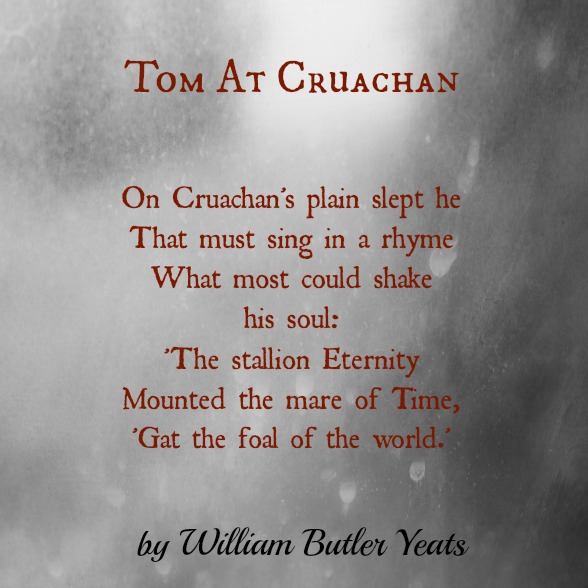
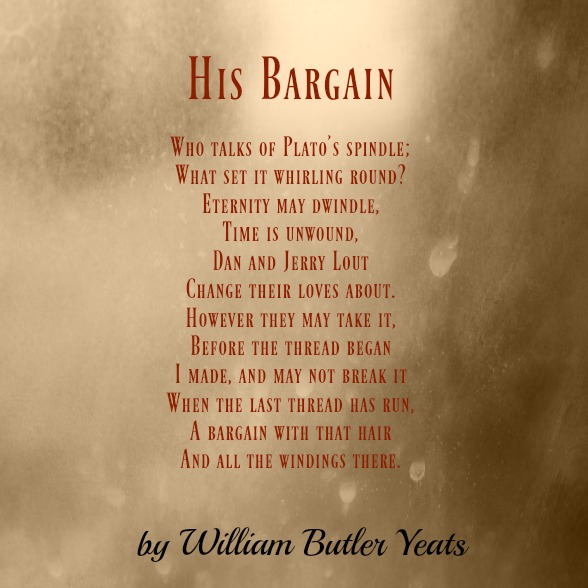
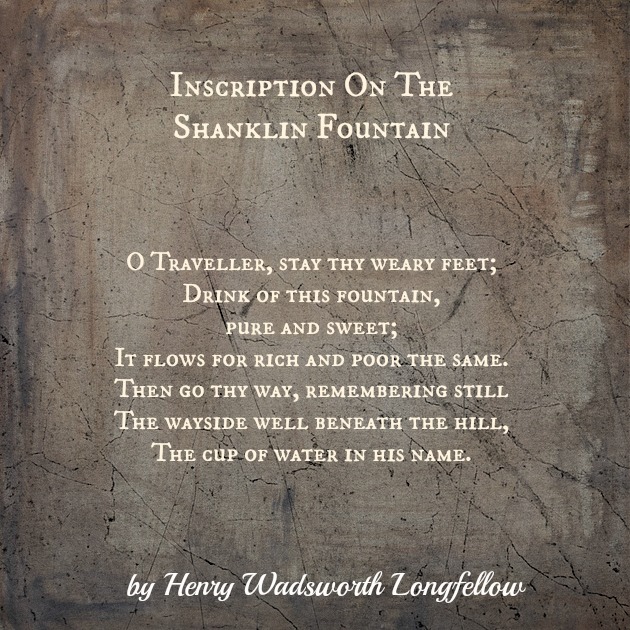
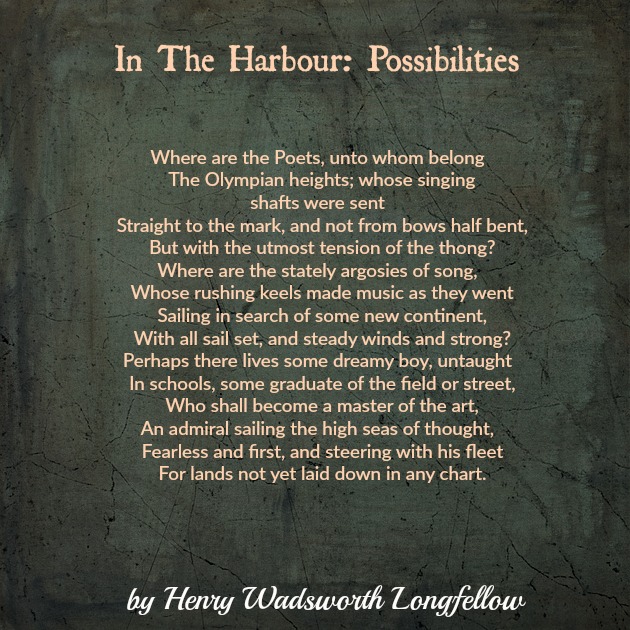
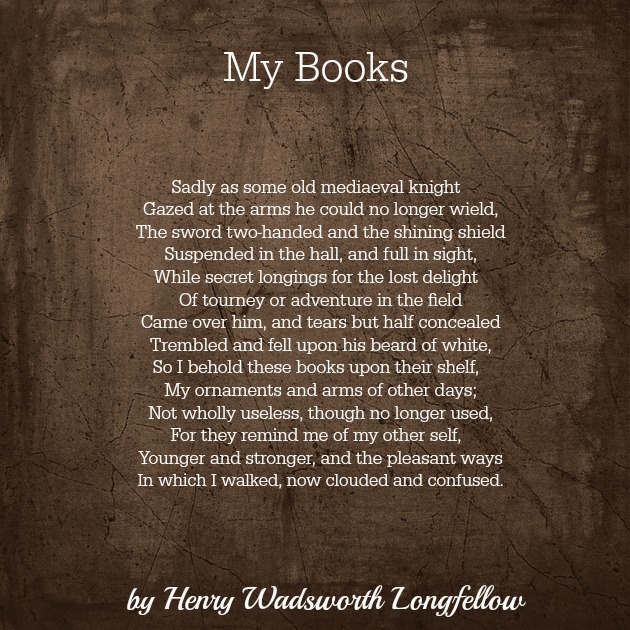
| Sway With Me sway with me, everything sad — madmen in stone houses without doors, lepers steaming love and song frogs trying to figure the sky; sway with me, sad things — fingers split on a forge old age like breakfast shell used books, used people used flowers, used love I need you I need you I need you: it has run away like a horse or a dog, dead or lost or unforgiving. by Charles Bukowski |
| Love & Fame & Death it sits outside my window now like and old woman going to market; it sits and watches me, it sweats nervously through wire and fog and dog-bark until suddenly I slam the screen with a newspaper like slapping at a fly and you could hear the scream over this plain city, and then it left. the way to end a poem like this is to become suddenly quiet. by Charles Bukowski |
| Some People some people never go crazy. me, sometimes I'll lie down behind the couch for 3 or 4 days. they'll find me there. it's Cherub, they'll say, and they pour wine down my throat rub my chest sprinkle me with oils. then, I'll rise with a roar, rant, rage - curse them and the universe as I send them scattering over the lawn. I'll feel much better, sit down to toast and eggs, hum a little tune, suddenly become as lovable as a pink overfed whale. some people never go crazy. what truly horrible lives they must lead. by Charles Bukowski |
| Curtain the final curtain on one of the longest running musicals ever, some people claim to have seen it over one hundred times. I saw it on the tv news, that final curtain: flowers, cheers, tears, a thunderous accolade. I have not seen this particular musical but I know if I had that I wouldn't have been able to bear it, it would have sickened me. trust me on this, the world and its peoples and its artful entertainment has done very little for me, only to me. still, let them enjoy one another, it will keep them from my door and for this, my own thunderous accolade. by Charles Bukowski |
| And The Moon And The Stars And The World Long walks at night— that's what good for the soul: peeking into windows watching tired housewives trying to fight off their beer-maddened husbands. by Charles Bukowski |
| Finish We are like roses that have never bothered to bloom when we should have bloomed and it is as if the sun has become disgusted with waiting by Charles Bukowski |
| Storm His face was charged with beauty as a cloud With glimmering lightning. When it shadowed me I shook, and was uneasy as a tree That draws the brilliant danger, tremulous, bowed. So must I tempt that face to loose its lightning. Great gods, whose beauty is death, will laugh above, Who made his beauty lovelier than love. I shall be bright with their unearthly brightening. And happier were it if my sap consume; Glorious will shine the opening of my heart; The land shall freshen that was under gloom; What matter if all men cry aloud and start, And women hide bleak faces in their shawl, At those hilarious thunders of my fall? by Wilfred Owen |
| The Unreturning Suddenly night crushed out the day and hurled Her remnants over cloud-peaks, thunder-walled. Then fell a stillness such as harks appalled When far-gone dead return upon the world. There watched I for the Dead; but no ghost woke. Each one whom Life exiled I named and called. But they were all too far, or dumbed, or thralled, And never one fared back to me or spoke. Then peered the indefinite unshapen dawn With vacant gloaming, sad as half-lit minds, The weak-limned hour when sick men's sighs are drained. And while I wondered on their being withdrawn, Gagged by the smothering Wing which none unbinds, I dreaded even a heaven with doors so chained. by Wilfred Owen |
| Song Of Songs Sing me at morn but only with your laugh; Even as Spring that laugheth into leaf; Even as Love that laugheth after Life. Sing me but only with your speech all day, As voluble leaflets do; let viols die; The least word of your lips is melody! Sing me at eve but only your sigh! Like lifting seas it solaceth; breathe so, Slowly and low, the sense that no songs say. Sing me at midnight with your murmurous heart! Let youth's immortal-moaning chord be heard Throbbing through you, and sobbing, unsubdued. by Wilfred Owen |
| Sonnet To My Friend - With An Identity Disc If ever I had dreamed of my dead name High in the heart of London, unsurpassed By Time for ever, and the Fugitive, Fame, There seeking a long sanctuary at last, - Or if I onetime hoped to hide its shame, - Shame of success, and sorrow of defeats, - Under those holy cypresses, the same That shade always the quiet place of Keats, Now rather thank I God there is no risk Of gravers scoring it with florid screed. Let my inscription be this soldier's disc. Wear it, sweet friend. Inscribe no date nor deed. But may thy heart-beat kiss it, night and day, Until the name grow blurred and fade away. by Wilfred Owen |
| Cramped In That Funnelled Hole Cramped in that funnelled hole, they watched the dawn Open a jagged rim around; a yawn Of death's jaws, which had all but swallowed them Stuck in the bottom of his throat of phlegm. They were in one of many mouths of Hell Not seen of seers in visions, only felt As teeth of traps; when bones and the dead are smelt Under the mud where long ago they fell Mixed with the sour sharp odour of the shell. by Wilfred Owen |
| Maundy Thursday Between the brown hands of a server-lad The silver cross was offered to be kissed. The men came up, lugubrious, but not sad, And knelt reluctantly, half-prejudiced. (And kissing, kissed the emblem of a creed.) Then mourning women knelt; meek mouths they had, (And kissed the Body of the Christ indeed.) Young children came, with eager lips and glad. (These kissed a silver doll, immensely bright.) Then I, too, knelt before that acolyte. Above the crucifix I bent my head: The Christ was thin, and cold, and very dead: And yet I bowed, yea, kissed - my lips did cling. (I kissed the warm live hand that held the thing.) by Wilfred Owen |
| Oh you Knid, you are vile and vermicious.... Oh you Knid, you are vile and vermicious! You are slimy and soggy and squishous! But what do we care 'Cause you can't get in here, So hop it and don't get ambitious! by Roald Dahl |
| Down they go... Down they go! Hail and snow! Freezes and sneezes and noses will blow! by Roald Dahl |
| I had a little nut-tree, I had a little nut-tree, Nothing would it bear. I searched in all its branches, But not a nut was there. "Oh, little tree," I begged, "Give me just a few." The little tree looked down at me And whispered, "Nuts to you." by Roald Dahl |
| "My teacher wasn't half as nice as yours seems to be" "My teacher wasn't half as nice as yours seems to be. His name was Mister Unsworth and he taught us history. And when you didn't know a date he'd get you by the ear And start to twist while you sat there quite paralysed with fear. He'd twist and twist and twist your ear and twist it more and more. Until at last the ear came off and landed on the floor. Our class was full of one-eared boys. I'm certain there were eight. Who'd had them twisted off because they didn't know a date. So let us now praise teachers who today are all so fine And yours in particular is totally divine." by Roald Dahl |
| St Ives As I was going to St Ives I met a man with seven wives Said he, 'I think it's much more fun Than getting stuck with only one.' by Roald Dahl |
| Hot And Cold A woman who my mother knows Came in and took off all her clothes. Said I, not being very old, 'By golly gosh, you must be cold!' 'No, no!' she cried. 'Indeed I'm not! I'm feeling devilishly hot!' by Roald Dahl |
| In May Oh to have you in May, To talk with you under the trees, Dreaming throughout the day, Drinking the wine-like breeze, Oh it were sweet to think That May should be ours again, Hoping it not, I shrink, Out of the sight of men. May brings the flowers to bloom, It brings the green leaves to the tree, And the fatally sweet perfume, Of what you once were to me. by Paul Laurence Dunbar |
| Sonnet On An Old Book With Uncut Leaves Emblem of blasted hope and lost desire, No finger ever traced thy yellow page Save Time's. Thou hast not wrought to noble rage The hearts thou wouldst have stirred. Not any fire Save sad flames set to light a funeral pyre Dost thou suggest. Nay,--impotent in age, Unsought, thou holdst a corner of the stage And ceasest even dumbly to aspire. How different was the thought of him that writ. What promised he to love of ease and wealth, When men should read and kindle at his wit. But here decay eats up the book by stealth, While it, like some old maiden, solemnly, Hugs its incongruous virginity! by Paul Laurence Dunbar |
| Love Despoiled As lone I sat one summer's day, With mien dejected, Love came by; His face distraught, his locks astray, So slow his gait, so sad his eye, I hailed him with a pitying cry: "Pray, Love, what has disturbed thee so?" Said I, amazed. "Thou seem'st bereft; And see thy quiver hanging low,-- What, not a single arrow left? Pray, who is guilty of this theft?" Poor Love looked in my face and cried: "No thief were ever yet so bold To rob my quiver at my side. But Time, who rules, gave ear to Gold, And all my goodly shafts are sold." by Paul Laurence Dunbar |
| The Dove Out of the sunshine and out of the heat, Out of the dust of the grimy street, A song fluttered down in the form of a dove, And it bore me a message, the one word--Love! Ah, I was toiling, and oh, I was sad: I had forgotten the way to be glad. Now, smiles for my sadness and for my toil, rest Since the dove fluttered down to its home in my breast! by Paul Laurence Dunbar |
| A Golden Day I FOUND you and I lost you, All on a gleaming day. The day was filled with sunshine, And the land was full of May. A golden bird was singing Its melody divine, I found you and I loved you, And all the world was mine. I found you and I lost you, All on a golden day, But when I dream of you, dear, It is always brimming May. by Paul Laurence Dunbar |
| Encouraged BECAUSE you love me I have much achieved, Had you despised me then I must have failed, But since I knew you trusted and believed, I could not disappoint you and so prevailed. by Paul Laurence Dunbar |
| Dawn AN angel, robed in spotless white, Bent down and kissed the sleeping Night. Night woke to blush; the sprite was gone. Men saw the blush and called it Dawn. by Paul Laurence Dunbar |
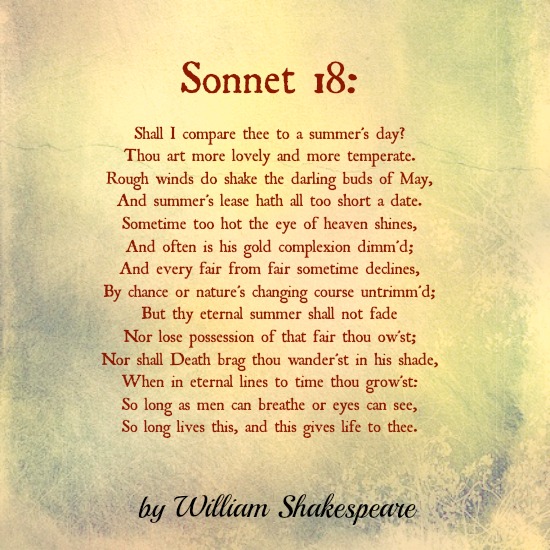
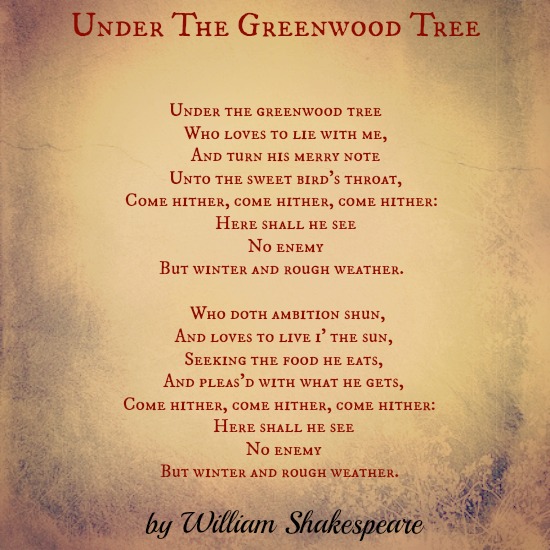
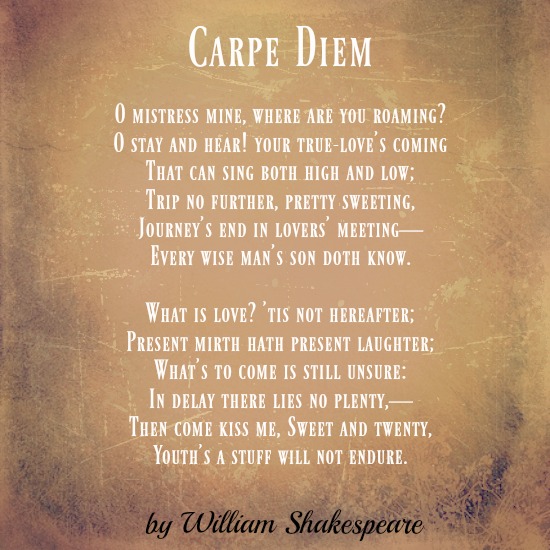
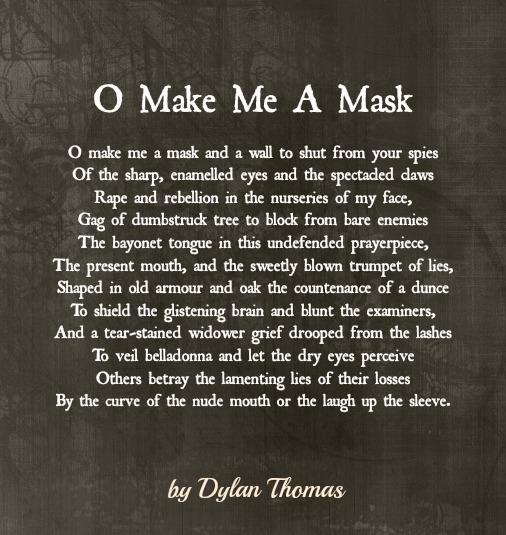
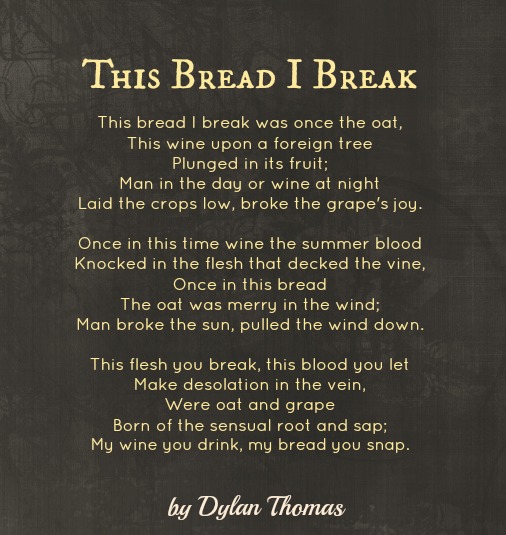
| Indian Weavers WEAVERS, weaving at break of day, Why do you weave a garment so gay? . . . Blue as the wing of a halcyon wild, We weave the robes of a new-born child. Weavers, weaving at fall of night, Why do you weave a garment so bright? . . . Like the plumes of a peacock, purple and green, We weave the marriage-veils of a queen. Weavers, weaving solemn and still, What do you weave in the moonlight chill? . . . White as a feather and white as a cloud, We weave a dead man's funeral shroud. by Sarojini Naidu |
| Leili THE serpents are asleep among the poppies, The fireflies light the soundless panther's way To tangled paths where shy gazelles are straying, And parrot-plumes outshine the dying day. O soft! the lotus-buds upon the stream Are stirring like sweet maidens when they dream. A caste-mark on the azure brows of Heaven, The golden moon burns sacred, solemn, bright The winds are dancing in the forest-temple, And swooning at the holy feet of Night. Hush! in the silence mystic voices sing And make the gods their incense-offering. by Sarojini Naidu |
| The Snake Charmer WHITHER dost thou hide from the magic of my flute-call? In what moonlight-tangled meshes of perfume, Where the clustering keovas guard the squirrel's slumber, Where the deep woods glimmer with the jasmine's bloom? I'll feed thee, O beloved, on milk and wild red honey, I'll bear thee in a basket of rushes, green and white, To a palace-bower where golden-vested maidens Thread with mellow laughter the petals of delight. Whither dost thou loiter, by what murmuring hollows, Where oleanders scatter their ambrosial fire? Come, thou subtle bride of my mellifluous wooing, Come, thou silver-breasted moonbeam of de- sire! by Sarojini Naidu |
Humayun To Zobeida (From the Urdu) You flaunt your beauty in the rose, your glory in the dawn, Your sweetness in the nightingale, your white- ness in the swan. You haunt my waking like a dream, my slumber like a moon, Pervade me like a musky scent, possess me like a tune. Yet, when I crave of you, my sweet, one tender moment's grace, You cry, "I sit behind the veil, I cannot show my face." Shall any foolish veil divide my longing from my bliss? Shall any fragile curtain hide your beauty from my kiss? What war is this of Thee and Me? Give o'er the wanton strife, You are the heart within my heart, the life within my life. by Sarojini Naidu |
| To Youth O YOUTH, sweet comrade Youth, wouldst thou be gone? Long have we dwelt together, thou and I; Together drunk of many an alien dawn, And plucked the fruit of many an alien sky. Ah, fickle friend, must I, who yesterday Dreamed forwards to long, undimmed ecstasy, Henceforward dream, because thou wilt not stay, Backward to transient pleasure and to thee? I give thee back thy false, ephemeral vow; But, O beloved comrade, ere we part, Upon my mournful eyelids and my brow Kiss me who hold thine image in my heart. by Sarojini Naidu |
| Suttee LAMP of my life, the lips of Death Hath blown thee out with their sudden breath; Naught shall revive thy vanished spark . . . Love, must I dwell in the living dark? Tree of my life, Death's cruel foot Hath crushed thee down to thy hidden root; Nought shall restore thy glory fled . . . Shall the blossom live when the tree is dead? Life of my life, Death's bitter sword Hath severed us like a broken word, Rent us in twain who are but one . . Shall the flesh survive when the soul is gone? by Sarojini Naidu |
| Gold Mouths Cry Gold mouths cry with the green young certainty of the bronze boy remembering a thousand autumns and how a hundred thousand leaves came sliding down his shoulder blades persuaded by his bronze heroic reason. We ignore the coming doom of gold and we are glad in this bright metal season. Even the dead laugh among the goldenrod. The bronze boy stands kneedeep in centuries, and never grieves, remembering a thousand autumns, with sunlight of a thousand years upon his lips and his eyes gone blind with leaves. by Sylvia Plath |
| For A Fatherless Son You will be aware of an absence, presently, Growing beside you, like a tree, A death tree, color gone, an Australian gum tree —- Balding, gelded by lightning—an illusion, And a sky like a pig's backside, an utter lack of attention. But right now you are dumb. And I love your stupidity, The blind mirror of it. I look in And find no face but my own, and you think that's funny. It is good for me To have you grab my nose, a ladder rung. One day you may touch what's wrong —- The small skulls, the smashed blue hills, the godawful hush. Till then your smiles are found money. by Sylvia Plath |
| New Year On Dartmoor This is newness : every little tawdry Obstacle glass-wrapped and peculiar, Glinting and clinking in a saint's falsetto. Only you Don't know what to make of the sudden slippiness, The blind, white, awful, inaccessible slant. There's no getting up it by the words you know. No getting up by elephant or wheel or shoe. We have only come to look. You are too new To want the world in a glass hat. by Sylvia Plath |
| Conversation Among The Ruins Through portico of my elegant house you stalk With your wild furies, disturbing garlands of fruit And the fabulous lutes and peacocks, rending the net Of all decorum which holds the whirlwind back. Now, rich order of walls is fallen; rooks croak Above the appalling ruin; in bleak light Of your stormy eye, magic takes flight Like a daunted witch, quitting castle when real days break. Fractured pillars frame prospects of rock; While you stand heroic in coat and tie, I sit Composed in Grecian tunic and psyche-knot, Rooted to your black look, the play turned tragic: Which such blight wrought on our bankrupt estate, What ceremony of words can patch the havoc? by Sylvia Plath |
| Aftermath Compelled by calamity's magnet They loiter and stare as if the house Burnt-out were theirs, or as if they thought Some scandal might any minute ooze From a smoke-choked closet into light; No deaths, no prodigious injuries Glut these hunters after an old meat, Blood-spoor of the austere tragedies. Mother Medea in a green smock Moves humbly as any housewife through Her ruined apartments, taking stock Of charred shoes, the sodden upholstery: Cheated of the pyre and the rack, The crowd sucks her last tear and turns away. by Sylvia Plath |
| Landowners From my rented attic with no earth To call my own except the air-motes, I malign the leaden perspective Of identical gray brick houses, Orange roof-tiles, orange chimney pots, And see that first house, as if between Mirrors, engendering a spectral Corridor of inane replicas, Flimsily peopled. But landowners Own thier cabbage roots, a space of stars, Indigenous peace. Such substance makes My eyeful of reflections a ghost's Eyeful, which, envious,would define Death as striking root on one land-tract; Life, its own vaporous wayfarings. by Sylvia Plath |
| Bilbea BILBEA, I was in Babylon on Saturday night. I saw nothing of you anywhere. I was at the old place and the other girls were there, but no Bilbea. Have you gone to another house? or city? Why don't you write? I was sorry. I walked home half-sick. Tell me how it goes. Send me some kind of a letter. And take care of yourself. by Carl Sandburg |
| The Road And The End I shall foot it Down the roadway in the dusk, Where shapes of hunger wander And the fugitives of pain go by. I shall foot it In the silence of the morning, See the night slur into dawn, Hear the slow great winds arise Where tall trees flank the way And shoulder toward the sky. The broken boulders by the road Shall not commemorate my ruin. Regret shall be the gravel under foot. I shall watch for Slim birds swift of wing That go where wind and ranks of thunder Drive the wild processionals of rain. The dust of the traveled road Shall touch my hands and face. by Carl Sandburg |
| The South Wind Say So IF the oriole calls like last year when the south wind sings in the oats, if the leaves climb and climb on a bean pole saying over a song learnt from the south wind, if the crickets send up the same old lessons found when the south wind keeps on coming, we will get by, we will keep on coming, we will get by, we will come along, we will fix our hearts over, the south wind says so. by Carl Sandburg |
| Shenandoah IN the Shenandoah Valley, one rider gray and one rider blue, and the sun on the riders wondering. Piled in the Shenandoah, riders blue and riders gray, piled with shovels, one and another, dust in the Shenandoah taking them quicker than mothers take children done with play. The blue nobody remembers, the gray nobody remembers, it's all old and old nowadays in the Shenandoah.. . . And all is young, a butter of dandelions slung on the turf, climbing blue flowers of the wishing woodlands wondering: a midnight purple violet claims the sun among old heads, among old dreams of repeating heads of a rider blue and a rider gray in the Shenandoah. by Carl Sandburg |
| The Skyscraper Loves Night ONE by one lights of a skyscraper fling their checkering cross work on the velvet gown of night. I believe the skyscraper loves night as a woman and brings her playthings she asks for, brings her a velvet gown, And loves the white of her shoulders hidden under the dark feel of it all. The masonry of steel looks to the night for somebody it loves, He is a little dizzy and almost dances ... waiting ... dark ... by Carl Sandburg |
| Lost Desolate and lone All night long on the lake Where fog trails and mist creeps, The whistle of a boat Calls and cries unendingly, Like some lost child In tears and trouble Hunting the harbor's breast And the harbor's eyes. by Carl Sandburg |
| Celia Celia, we know, is sixty-five, Yet Celia's face is seventeen; Thus winter in her breast must live, While summer in her face is seen. How cruel Celia's fate, who hence Our heart's devotion cannot try; Too pretty for our reverence, Too ancient for our gallantry! by Alexander Pope |
| Occasioned By Some Verses of His Grace the Duke of Buckingham Muse, 'tis enough: at length thy labour ends, And thou shalt live, for Buckingham commends. Let Crowds and Critics now my verse assail, Let Dennis write, and nameless numbers rail: This more than pays whole years of thankless pain; Time, health, and fortune are not lost in vain. Sheffield approves, consenting Phoebus bends, And I and Malice from this hour are friends. by Alexander Pope |
| The Three Gentle Shepherds Of gentle Philips will I ever sing, With gentle Philips shall the valleys ring. My numbers too for ever will I vary, With gentle Budgell and with gentle Carey. Or if in ranging of the names I judge ill, With gentle Carey and with gentle Budgell: Oh! may all gentle bards together place ye, Men of good hearts, and men of delicacy. May satire ne'er befool ye, or beknave ye, And from all wits that have a knack, God save ye. by Alexander Pope |
| On a Fan of the Author's Design Come gentle Air! th' AEolian shepherd said, While Procris panted in the secret shade: Come, gentle Air, the fairer Delia cries, While at her feet her swain expiring lies. Lo the glad gales o'er all her beauties stray, Breathe on her lips, and in her bosom play! In Delia's hand this toy is fatal found, Nor could that fabled dart more surely wound: Both gifts destructive to the givers prove; Alike both lovers fall by those they love. Yet guiltless too this bright destroyer lives, At random wounds, nor knows the wound she gives: She views the story with attentive eyes, And pities Procris, while her lover dies. by Alexander Pope |
| On His Grotto at Twickenham Thou who shalt stop, where Thames' translucent wave Shines a broad Mirror thro' the shadowy Cave; Where ling'ring drops from min'ral Roofs distill, And pointed Crystals break the sparkling Rill, Unpolish'd Gems no ray on Pride bestow, And latent Metals innocently glow. Approach! Great Nature studiously behold; And eye the Mine without a wish for Gold. Approach; but awful! Lo! th' Egerian Grot, Where, nobly-pensive, St. John sate and thought; Where British sighs from dying Wyndham stole, And the bright flame was shot thro' Marchmont's Soul. Let such, such only tread this sacred Floor, Who dare to love their Country, and be poor. by Alexander Pope |
| On Seeing the Ladies Crux-Easton Walk in the Woods by the Grotto. Authors the world and their dull brains have traced To fix the ground where Paradise was placed; Mind not their learned whims and idle talk; Here, here's the place where these bright angels walk. by Alexander Pope |
| On Colley Cibber In merry old England it once was the rule The King had his poet and also his fool But now were so frugal I have you to know it That Cibber can serve both for fool and for poet! by Alexander Pope |
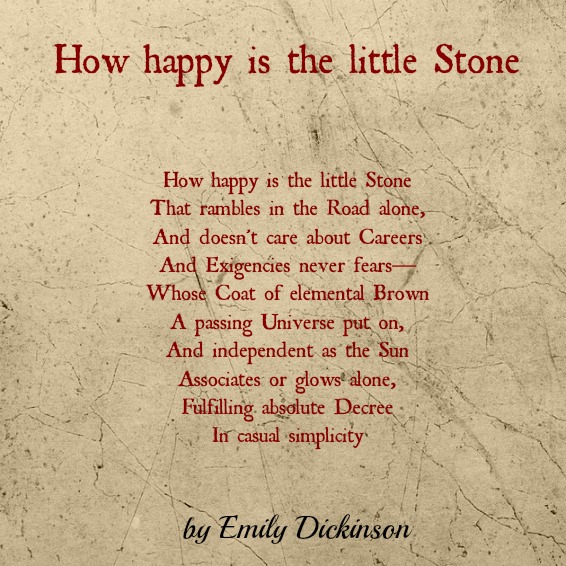
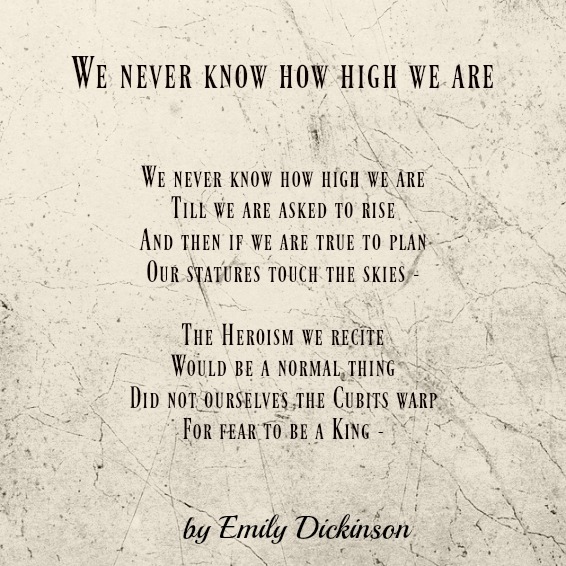
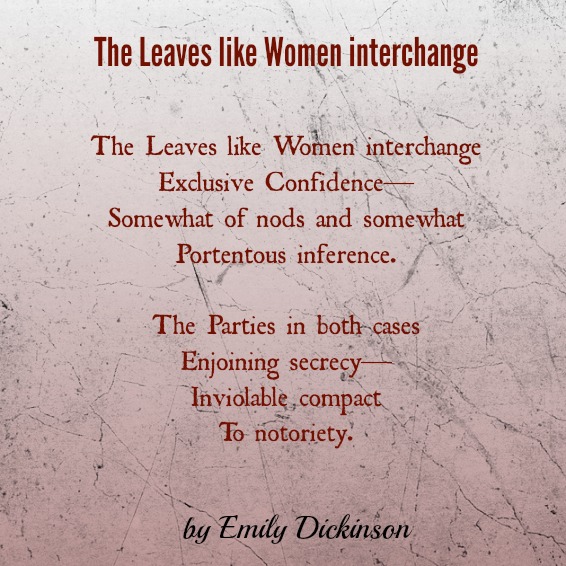
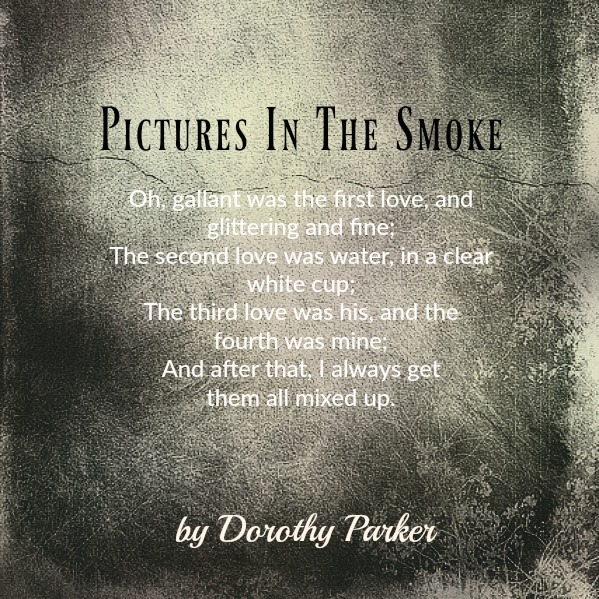
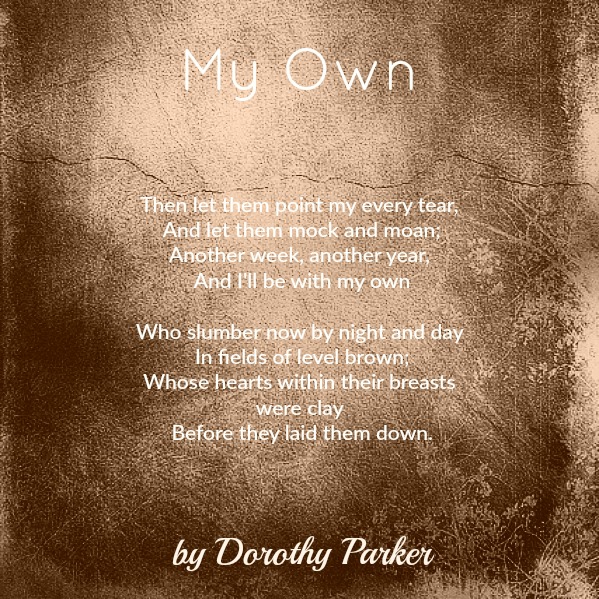
| Sonnet On An Alpine Night My hand, a little raised, might press a star- Where I may look, the frosted peaks are spun, So shaped before Olympus was begun, Spanned each to each, now, by a silver bar. Thus to face Beauty have I traveled far, But now, as if around my heart were run Hard, lacing fingers, so I stand undone. Of all my tears, the bitterest these are. Who humbly followed Beauty all her ways, Begging the brambles that her robe had passed, Crying her name in corridors of stone, That day shall know his weariedest of days - When Beauty, still and suppliant at last, Does not suffice him, once they are alone. by Dorothy Parker |
| The Apple Tree When first we saw the apple tree The boughs were dark and straight, But never grief to give had we, Though Spring delayed so late. When last I came away from there The boughs were heavy hung, But little grief had I to spare For Summer, perished young. by Dorothy Parker |
| Sight Unseemly are the open eyes That watch the midnight sheep, That look upon the secret skies Nor close, abashed, in sleep; That see the dawn drag in, unbidden, To birth another day- Oh, better far their gaze were hidden Below the decent clay. by Dorothy Parker |
| Garden-Spot God's acre was her garden-spot, she said; She sat there often, of the Summer days, Little and slim and sweet, among the dead, Her hair a fable in the leveled rays. She turned the fading wreath, the rusted cross, And knelt to coax about the wiry stem. I see her gentle fingers on the moss Now it is anguish to remember them. And once I saw her weeping, when she rose And walked a way and turned to look around- The quick and envious tears of one that knows She shall not lie in consecrated ground. by Dorothy Parker |
| Vers Demode For one, the amaryllis and the rose; The poppy, sweet as never lilies are; The ripen'd vine, that beckons as it blows; The dancing star. For one, the trodden rosemary and rue; The bowl, dipt ever in the purple stream And, for the other one, a fairer due- Sleep, and no dream. by Dorothy Parker |
| Summary Every love's the love before In a duller dress. That's the measure of my lore- Here's my bitterness: Would I knew a little more, Or very much less! by Dorothy Parker |
| La Fuite De La Lune To outer senses there is peace, A dreamy peace on either hand Deep silence in the shadowy land, Deep silence where the shadows cease. Save for a cry that echoes shrill From some lone bird disconsolate; A corncrake calling to its mate; The answer from the misty hill. And suddenly the moon withdraws Her sickle from the lightening skies, And to her sombre cavern flies, Wrapped in a veil of yellow gauze. by Oscar Wilde |
| Impression de Voyage The sea was sapphire coloured, and the sky Burned like a heated opal through the air; We hoisted sail; the wind was blowing fair For the blue lands that to the eastward lie. From the steep prow I marked with quickening eye Zakynthos, every olive grove and creek, Ithaca's cliff, Lycaon's snowy peak, And all the flower-strewn hills of Arcady. The flapping of the sail against the mast, The ripple of the water on the side, The ripple of girls' laughter at the stern, The only sounds:- when 'gan the West to burn, And a red sun upon the seas to ride, I stood upon the soil of Greece at last! by Oscar Wilde |
| Le Jardin The lily's withered chalice falls Around its rod of dusty gold, And from the beech-trees on the wold The last wood-pigeon coos and calls. The gaudy leonine sunflower Hangs black and barren on its stalk, And down the windy garden walk The dead leaves scatter, - hour by hour. Pale privet-petals white as milk Are blown into a snowy mass: The roses lie upon the grass Like little shreds of crimson silk. by Oscar Wilde |
| Portia . I MARVEL not Bassanio was so bold To peril all he had upon the lead, Or that proud Aragon bent low his head, Or that Morocco's fiery heart grew cold: For in that gorgeous dress of beaten gold Which is more golden than the golden sun, No woman Veronesé looked upon Was half so fair as thou whom I behold. Yet fairer when with wisdom as your shield The sober-suited lawyer's gown you donned And would not let the laws of Venice yield Antonio's heart to that accursèd Jew— O Portia! take my heart: it is thy due: I think I will not quarrel with the Bond. by Oscar Wilde |
| Tristitiae O well for him who lives at ease With garnered gold in wide domain, Nor heeds the splashing of the rain, The crashing down of forest trees. O well for him who ne'er hath known The travail of the hungry years, A father grey with grief and tears, A mother weeping all alone. But well for him whose foot hath trod The weary road of toil and strife, Yet from the sorrows of his life. Builds ladders to be nearer God. by Oscar Wilde |
| Symphony In Yellow An omnibus across the bridge Crawls like a yellow butterfly, And, here and there a passer-by Shows like a little restless midge. Big barges full of yellow hay Are moored against the shadowy wharf, And, like a yellow silken scarf, The thick fog hangs along the quay. The yellow leaves begin to fade And flutter from the temple elms, And at my feet the pale green Thames Lies like a rod of rippled jade. by Oscar Wilde |
| Les Ballons Against these turbid turquoise skies The light and luminous balloons Dip and drift like satin moons Drift like silken butterflies; Reel with every windy gust, Rise and reel like dancing girls, Float like strange transparent pearls, Fall and float like silver dust. Now to the low leaves they cling, Each with coy fantastic pose, Each a petal of a rose Straining at a gossamer string. Then to the tall trees they climb, Like thin globes of amethyst, Wandering opals keeping tryst With the rubies of the lime. by Oscar Wilde |
| A Vision . TWO crownèd Kings, and One that stood alone With no green weight of laurels round his head, But with sad eyes as one uncomforted, And wearied with man's never-ceasing moan For sins no bleating victim can atone, And sweet long lips with tears and kisses fed. Girt was he in a garment black and red, And at his feet I marked a broken stone Which sent up lilies, dove-like, to his knees. Now at their sight, my heart being lit with flame I cried to Beatricé, "Who are these?" And she made answer, knowing well each name, "Æschylos first, the second Sophokles, And last (wide stream of tears!) Euripides." by Oscar Wilde |
| Vita Nuova I stood by the unvintageable sea Till the wet waves drenched face and hair with spray, The long red fires of the dying day Burned in the west; the wind piped drearily; And to the land the clamorous gulls did flee: "Alas!" I cried, "my life is full of pain, And who can garner fruit or golden grain, From these waste fields which travail ceaselessly!" My nets gaped wide with many a break and flaw Nathless I threw them as my final cast Into the sea, and waited for the end. When lo! a sudden glory! and I saw The argent splendour of white limbs ascend, And in that joy forgot my tortured past. by Oscar Wilde |
| Wasted Days A fair slim boy not made for this world's pain. With hair of gold thick clustering round his ears, And longing eyes half veiled by foolish tears Like bluest water seen through mists of rain: - Pale cheeks whereon no kiss hath left its stain, Red under lip drawn for fear of Love, And white throat whiter than the breast of dove. Alas! alas! if all should be in vain. - Behind, wide fields, and reapers all a-row In heat and labour toiling wearily, To no sweet sound of laughter or of lute. The sun is shooting wide its crimson glow, Still the boy dreams: nor knows that night is nigh, And in the night-time no man gathers fruit. by Oscar Wilde |
| I am only the house of your beloved "I am only the house of your beloved, not the beloved herself: true love is for the treasure, not for the coffer that contains it." The real beloved is that one who is unique, who is your beginning and your end. When you find that one, you'll no longer expect anything else: that is both the manifest and the mystery. That one is the lord of states of feeling, dependent on none; month and year are slaves to that moon. When he bids the "state," it does His bidding; when that one wills, bodies become spirit. by Mewlana Jalaluddin Rumi |
| Love is reckless Love is reckless; not reason. Reason seeks a profit. Love comes on strong, consuming herself, unabashed. Yet, in the midst of suffering, Love proceeds like a millstone, hard surfaced and straightforward. Having died of self-interest, she risks everything and asks for nothing. Love gambles away every gift God bestows. Without cause God gave us Being; without cause, give it back again. by Mewlana Jalaluddin Rumi |
| The beauty of the heart The beauty of the heart is the lasting beauty: its lips give to drink of the water of life. Truly it is the water, that which pours, and the one who drinks. All three become one when your talisman is shattered. That oneness you can't know by reasoning. by Mewlana Jalaluddin Rumi |
| Lovers O lovers, lovers it is time to set out from the world. I hear a drum in my soul's ear coming from the depths of the stars. Our camel driver is at work; the caravan is being readied. He asks that we forgive him for the disturbance he has caused us, He asks why we travelers are asleep. Everywhere the murmur of departure; the stars, like candles thrust at us from behind blue veils, and as if to make the invisible plain, a wondrous people have come forth. by Mewlana Jalaluddin Rumi |
| A Moment Of Happiness A moment of happiness, you and I sitting on the verandah, apparently two, but one in soul, you and I. We feel the flowing water of life here, you and I, with the garden's beauty and the birds singing. The stars will be watching us, and we will show them what it is to be a thin crescent moon. You and I unselfed, will be together, indifferent to idle speculation, you and I. The parrots of heaven will be cracking sugar as we laugh together, you and I. In one form upon this earth, and in another form in a timeless sweet land. by Mewlana Jalaluddin Rumi |
| Mist Low-anchored cloud, Newfoundland air, Fountain head and source of rivers, Dew-cloth, dream drapery, And napkin spread by fays; Drifting meadow of the air, Where bloom the dasied banks and violets, And in whose fenny labyrinth The bittern booms and heron wades; Spirit of the lake and seas and rivers, Bear only perfumes and the scent Of healing herbs to just men's fields! by Henry David Thoreau |
| I Am The Autumnal Sun Sometimes a mortal feels in himself Nature — not his Father but his Mother stirs within him, and he becomes immortal with her immortality. From time to time she claims kindredship with us, and some globule from her veins steals up into our own. I am the autumnal sun, With autumn gales my race is run; When will the hazel put forth its flowers, Or the grape ripen under my bowers? When will the harvest or the hunter's moon Turn my midnight into mid-noon? I am all sere and yellow, And to my core mellow. The mast is dropping within my woods, The winter is lurking within my moods, And the rustling of the withered leaf Is the constant music of my grief… by Henry David Thoreau |
| Men Say They Know Many Things Men say they know many things; But lo! they have taken wings, — The arts and sciences, And a thousand appliances; The wind that blows Is all that any body knows. by Henry David Thoreau |
| Nature O Nature! I do not aspire To be the highest in thy choir, - To be a meteor in thy sky, Or comet that may range on high; Only a zephyr that may blow Among the reeds by the river low; Give me thy most privy place Where to run my airy race. In some withdrawn, unpublic mead Let me sigh upon a reed, Or in the woods, with leafy din, Whisper the still evening in: Some still work give me to do, - Only - be it near to you! For I'd rather be thy child And pupil, in the forest wild, Than be the king of men elsewhere, And most sovereign slave of care; To have one moment of thy dawn, Than share the city's year forlorn. by Henry David Thoreau |
